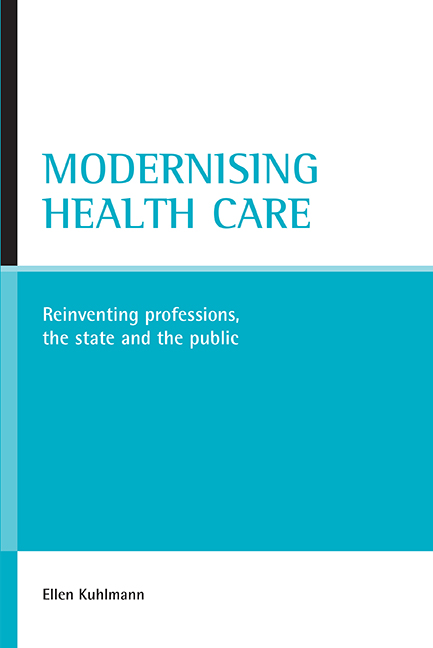Book contents
- Frontmatter
- Contents
- List of tables and figures
- Acknowledgements
- Abbreviations
- Glossary
- Introduction
- one Towards ‘citizen professionals’: contextualising professions and the state
- Part I Mapping change in comparative perspective
- Part II Dynamics of new governance in the German health system
- Part III The rise of a new professionalism in late modernity
- References
- Appendix: Research design of the empirical in-depth study
- Index
- Also available from The Policy Press
three - Remodelling a corporatist health system: change and conservative forces
Published online by Cambridge University Press: 15 January 2022
- Frontmatter
- Contents
- List of tables and figures
- Acknowledgements
- Abbreviations
- Glossary
- Introduction
- one Towards ‘citizen professionals’: contextualising professions and the state
- Part I Mapping change in comparative perspective
- Part II Dynamics of new governance in the German health system
- Part III The rise of a new professionalism in late modernity
- References
- Appendix: Research design of the empirical in-depth study
- Index
- Also available from The Policy Press
Summary
International calls for the coordination and integration of provider services, and participation of consumers, are echoed in Germany. In particular, the 2004 Health Modernisation Act paved the way for organisational change and new forms of managerialism and provider control. This chapter outlines the conditions and dynamics of modernising health care in a conservative corporatist welfare system, with particular emphasis on interoccupational change. By combining structure and policy, and static and dynamic analysis, it brings the reflexive nature of change in health into focus. Starting with an overview of the characteristics of the German health system, the major regulatory incentives of health reform Acts from the 1990s onwards are discussed; strategies are specified for quality management and new organisational models. This is followed by information on changes in the occupational structure. Putting the focus on the medical profession as a key player, physiotherapists and surgery receptionists are studied in order to grasp interoccupational dynamics. The findings highlight the coexistence of innovation and conservatism. Corporatism has not been replaced but is transformed and supplemented with elements from new governance. These developments put new challenges on the professions, and also new demands on the state to govern what has become a more hybrid network of public law institutions.
Regulatory framework: change and corporatist conservatism
Corporatism and federalism are key elements of health politics and a particular approach to policy making in Germany (Schwartz and Busse, 1997). Within the corporatist system of governance the state provides the framework for a network of public law institutions (Moran, 1999) and integrates federal interests by drawing on an extensive legal framework (Social Code Book V). The state hands over rights and responsibilities for service delivery to the corporatist self-governing institutions, which have mandatory membership and the right to negotiate contracts and raise their own financial resources. SHI funds and physicians’ associations are the ‘core’ of corporatist regulation. This structure is especially strong in ambulatory care, although this model is increasingly expanding to the hospital sector.
The Federal Association of SHI Physicians represents the interests of doctors on the provider side and is simultaneously a public law institution. This double function is the Achilles heel of Germany's health system and key to understanding corporatist regulation and the power of the medical profession. The medical profession is strongly self-regulated by statutory chambers established at federal, regional and local levels, and this also applies to dentists and pharmacists.
- Type
- Chapter
- Information
- Modernising Health CareReinventing Professions, the State and the Public, pp. 57 - 80Publisher: Bristol University PressPrint publication year: 2006



